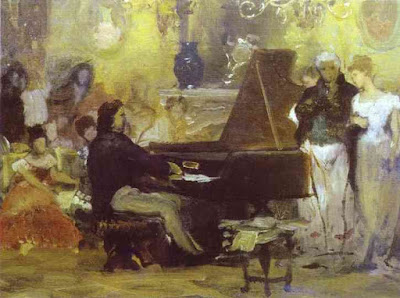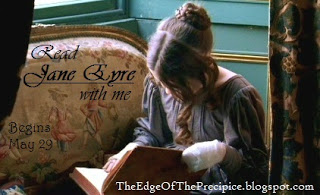Chapter XVII
Jane feels Rochester’s absence keenly and disappointment bubbles up at the speculation he could be gone indefinitely. But she gathers her senses and fights her emotions, bringing them under practical reign, and by the time they receive a letter from Mr. Rochester a fortnight later announcing his intent to return with a large party, she is composed.
As Rochester brings a houseful of guests, the reader is introduced to Blanche Ingram, a confident beauty who is attached to Mr. Rochester, as he appears attached to her. Her disdain for everything and everyone below her social standing is apparent, and her haughty rancour leaves Jane with a poor impression of her character. After hearing her imprecations against governesses, Jane attempts to escape to her room. Rochester waylays her, but none of his influence can induce her to return.
 |
| The Drawing Room at Townsend House (1885) Sir Lawrence Alma-Tadema source Wikiart |
In this chapter, Jane acknowledges that she is drawn to Rochester against her very will.
“{His features} were not beautiful, according to rule; but they were more than beautiful to me: they were full of an interest, an influence that quite mastered me, — that took my feelings from my own power and fettered them in his. I had not intended to love him: the reader knows I had wrought hard to extirpate from my soul the gems of love there detected; and now, at first renewed view of him, they spontaneously revived, green and strong! He made me love him without looking at me ……”
 |
| Young Woman at Piano (1878) Julius Leblanc Stewart source Wikiart |
Mr. Rochester is the life of the house party —- literally —- and everything becomes alive in his presence. We witness a game of charades between the guests, which appears to be designed to allow us to further sketch Blanche Ingram’s character. Jane is unimpressed:
“….. But I was not jealous; or very rarely; —- the nature of the pain I suffered could not be explained by that word. Miss Ingram was a mark beneath jealousy: she was too inferior to excite the feeling. Pardon the seeming paradox; I mean what I say. she was very showy, but she was not genuine; she had a fine person, many brilliant attainments; but her mind was poor, her heart barren by nature, nothing bloomed spointaneously on that soil; not unforced natural fruit delighted by its freshness. She was not good; she was not original …… she never offered, nor had, an opinion of her own. She advocated a high tone of sentiment; but she did not know the sensations of sympathy and pity, tenderness and truth were not in her. Too often she betrayed this ……”
Jane is distressed by the fact that Rochester seems to recognize these faults also, but still appears to keep to the matrimonial course with very little sentiment, an indication he is marrying for social reasons but not love.
As Rochester is gone to Millcote on business with a late evening return indicated, at dusk a visitor arrives, a Mr. Mason from Kingstown, Jamaica, to see the master of the house. As he waits, a footman informs the guests of another visitor, an old gypsy woman who wishes to read their fortunes. Miss Ingram goes first and later appears sour to what she has heard. The other guests are amazed at the gypsy woman’s perception with their fortunes. Then Jane herself is summoned.
 |
| Gypsy Woman (1886) Mykola Yaroshenko source Wikiart |
All the characterizations of the house guests, their behaviour and motivations are communicated through Jane’s eyes, although she does exhibit acute perception and appears to be a good judge of character. She does admit that Mr. Rochester’s faults are becoming dimmer to her and blending more into his character as a whole. I wonder if that is a good thing: does her “blindness” lead her to reject reality, or is it simply an accepting of him as a flawed person? One wonders ……
Chapter XIX
Jane is suspicious, reluctant to be lead by the old gypsy woman’s suppositions, even though her guesses appear quite accurate. When the gypsy reveals herself, she is Mr. Rochester in disguise. Jane appears not especially surprised by this new charade, but has to support her master, as he reels in shock when learning of the arrival of Mr. Mason. She does his bidding, fetching the unexpected visitor, and hears Rochester, in what seems to be good spirits, as she prepares for sleep.
 |
| Chopin Performing in the Guest-Hall of Anton Radziville in Berlin in 1829 (1887) Henryk Siemiradzki source Wikiart |



Call me prejudiced, but this play acting as a Gypsy to communicate or understand other's motives, is one of the reasons I cannot bring myself to like Rochester. His character through out has been on sneaking, hiding and using sly means….I know there are reasons for his actions, but somehow i cannot, simply cannot like them or absolve him from being a sneak!
I agree with you …… and then again, I don't agree. Clear as mud, I know. 😉
Yes, Rochester's gypsy-playing is rather infantile, but keep in mind he is trying to draw out Jane's feelings, and in other circumstances, she is too wise to reveal them to the extent that he wants. Not being particularly patient, or inventive, or even socially adept, he might see this performance as his only way. And it hopefully gives him a chance to mature later on and we will see Jane's positive effect on him. At least, I hope so …… :-Z
Pingback: Jane Eyre by Charlotte Brontë - Classical CarouselClassical Carousel